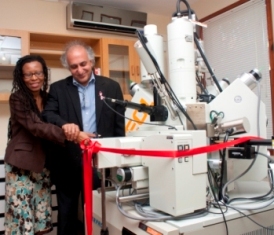
The Geology Department staff celebrated an early Christmas when they formally launched a JXA-8230 Super Probe Electron Probe Micro-analyser (EPMA) recently. The EPMA conducts high quality in situ quantitive analyses of elements as well as the chemical dating of monazite and cathodo-luminescence imaging, among many other functions.
Senior lecturer and HOD Dr Steve Prevec said the original electron probe initiated “a keystone in a 20-year boom of landmark publications and postgraduate activity” within the department. He considers the rejuvenation of the probe and its facility as symbolic of passing the torch to new hands, with the hope that it will stimulate and complement further departmental growth.
Dean of Science Prof Ric Bernard said that the EPMA will inspire “curiosity-driven studies and collaborative research”, as “no matter how modern or sexy the equipment,” it doesn’t guarantee high quality research unless deep and meaningful questions are examined by skilled technicians and researchers. Indeed, the EPMA is fully booked until mid December and has already generated funds for the department and the university as myriad researchers are keen to utilise it.
Dr Steffen Büttner, one of the principal probe researchers, as well as the prime driver of the successful equipment application, told the humorous story of the “strenuous, often nerve-wracking” process of how the probe was installed at the department. Because of the mid January deadline, “the single most recurring obstacle we faced was that Christmas kept happening at the most inconvenient times!”
Prof Goonie Marsh, the senior scientist on the funding proposal says the first EPMA ever to be delivered to a university in South Africa was to the Geology Department at UCT in 1972, where he was finalising his PhD research.
Known at the Old Jeol (a previous incarnation of the JEOL Superprobe,733), a similar one was acquired a few years later by the Rhodes Geology Department under the leadership of Prof Hugh Eales, who was also present at the launch.
Prof Marsh said “microprobes give an unexpected symmetry to my academic career” as the EPMA marks a new era for the department and the university.
Over 20 supporters from all over South Africa and abroad wrote letters of support and submitted proposals for their own work and the Library helped with the tricky installation process; sharing access to their diesel generator and granting permission to do so after a mere five minutes.
Ms Lindiwe Thabede of the NRF applauded the university for putting forward a high quality, multi-disciplinary approach research proposal. Rhodes has received a total of R32 million from NRF funded grants over the last few years.
Supplied by Advanced Laboratory Solutions (ALS) and partly funded by the National Research Foundation (NRF), who contributed R5.2 million rand and the university raising around R2.6 million, the EPMA probe now forms part of a brand new micro-analytical facility.
Vice-Chancellor Dr Saleem Badat and Ms Thabede officially opened the facility and special guests included Research and Development DVC Dr Peter Clayton, Mr Chris Botha (of ALS) Ms Jaine Roberts of the Research Office.
By Anna-Karien Otto
Photo by Desiree Schirlinger
